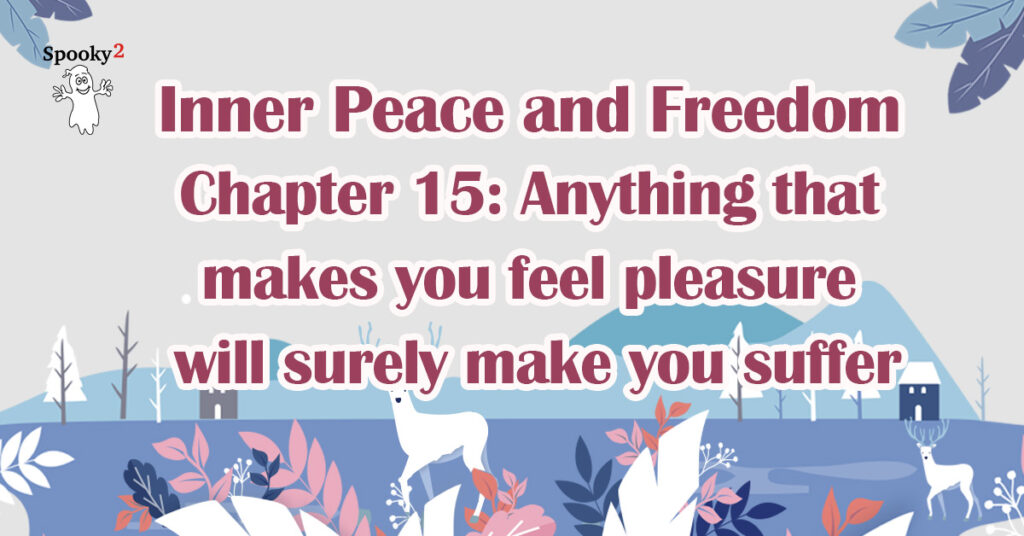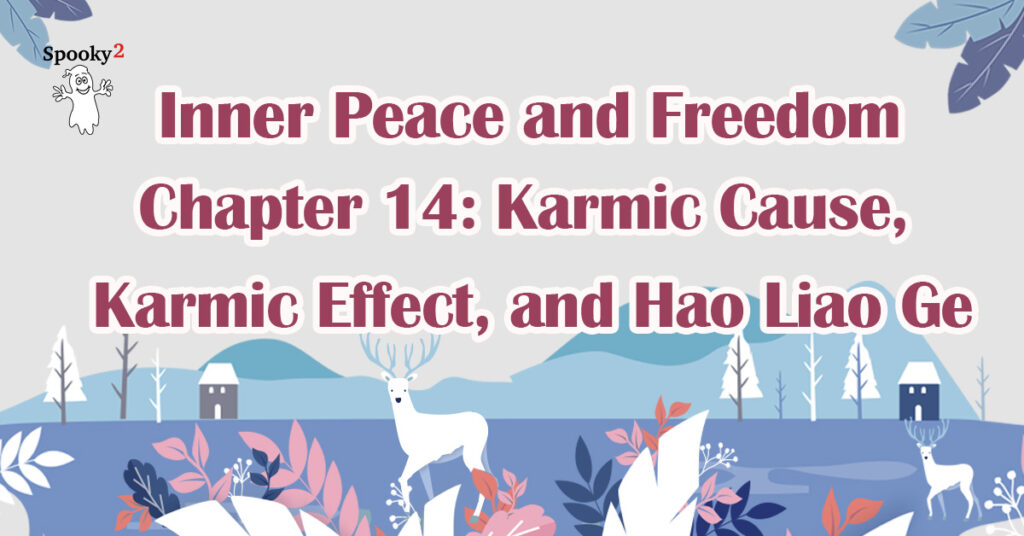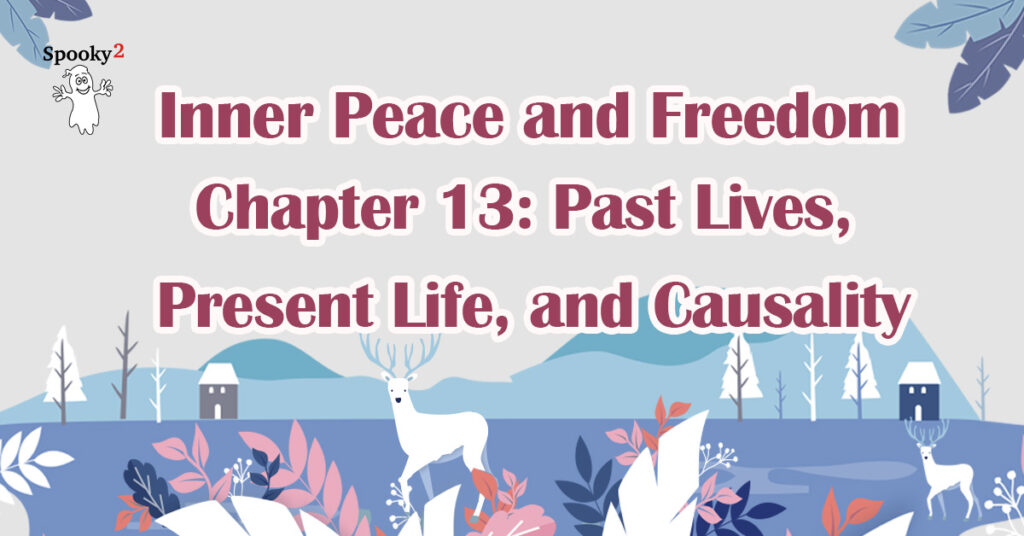There is a kind of joy called peace, which is different from happiness.
In Chapter 1, we mentioned that human suffering is primarily physical suffering, as well as psychological suffering, namely, the suffering of not getting what one wants, the suffering of separation from what one loves, and the suffering of encountering what one dislikes.
When these sufferings are alleviated, various negative emotions such as anxiety, worry, tension, and fear are also relieved. Humans refer to the experience of this process as “happiness”.
In the term ‘Kuai Le’ (happiness), ‘Kuai’ means fleeting, while ‘Le’ means alleviation. We refer to happiness as the suffering of change, because in this process, there is only the alleviation of suffering, without anything else.
However, when suffering or negative emotions are temporarily relieved, that is, when the suffering of change (happiness) disappears, this state of freedom from suffering, negative emotions, and suffering of change (happiness) is called “peace”.
Simply put, it is a state where there is neither suffering nor happiness. Peace is pure and free. However, this peace is relative and temporary, because suffering and negative emotions can emerge again at any time.
In fact, ordinary people rarely experience temporary peace. Most of their time is lived in suffering or the alleviation of suffering, in negative emotions or the alleviation of negative emotions.
When a person has weak attachment to their loved ones or things, they experience less suffering. With less suffering, they also experience less suffering of change (happiness). In this way, the relative and temporary peace they experience are more.
When a person has no attachment to their loved ones or things, they won’t suffer due to them. Without suffering, they won’t experience the suffering of change (happiness). In this case, concerning their loved ones or things, they have attained complete peace. As long as they don’t crave, they will attain lasting peace.
Let’s take the example of a smoker. When the craving for a cigarette arises, they experience suffering; when smoking, they experience the suffering of change (happiness).
Initially, they may smoke one pack every two days, then progress to one pack per day, two packs per day, or even three packs per day. The greater the addiction, the more intense the suffering, and the stronger the suffering of change (happiness) when smoking.
If an occasional smoker is not addicted to smoking, then their suffering of craving smoking is very weak, and their suffering of change (happiness) is also very weak, almost negligible. Compared to those with a smoking addiction, this state is relative peace.
If a person doesn’t smoke at all, not even a single cigarette, then they have neither suffering nor suffering of change (happiness) related to smoking. As a result, in regard to smoking, their peace is complete, lasting, pure, and free.
Let’s take playing mahjong or other gambling as another example. When the addiction arises, they experience suffering; when they lose a round, they experience another layer of suffering.
Initially, they may start with small bets, and then gradually increase their bets. (The gambling addiction intensifies over time.) When gambling, regardless of winning or losing, they prioritize satisfying their gambling addiction.
If they win, the suffering of change (happiness) is intense. If they lose, despite another layer of suffering, due to strong gambling addiction, some people still cannot stop even when they are about to go bankrupt.
If an occasional gambler is not addicted to gambling, then their mental suffering of craving gambling is very weak, and their suffering of change (happiness) is also very weak, almost negligible. Compared to those with a gambling addiction, this state is relative peace.
However, if a person doesn’t gamble at all, then they have neither suffering nor suffering of change (happiness) related to gambling. As a result, in regard to gambling, their peace is complete, lasting, pure, and free.
Some people may say, “If I have no hobby or desire at all, what’s the point of living?” Actually, this is impossible for humans. Humans are born with many innate and potential needs, leading to numerous suffering.
As they age and under the influence or stimulation of the environment, the suffering of not getting what one wants, the suffering of separation from what one loves, and the suffering of encountering what one dislikes, as well as the suffering of various illnesses, will constantly emerge. Thus, they have to seek methods to alleviate or temporarily remove the sufferings.
We should understand that in most cases, when something is in the hobby stage, people are willing to do it. This is because the suffering of not getting what one wants is relatively weak, and it is easy to implement and satisfy them.
During implementation, both suffering and negative emotions are alleviated, and this suffering of change (happiness) seems to be a reason for ordinary people to continue living.
When a person’s basic physical needs, such as food and clothing, are satisfied, other innate and potential needs will constantly emerge. For example, social needs, the need for respect, the need for knowledge, aesthetic needs, etc.
Meeting these needs is accepted by the general public. Hence, the entertainment and education industries are prosperous, as they are not only legal but also in line with universal values.
However, most people have never thought that interests may become hobbies, hobbies may become obsessions, and obsessions may become addictions. And all hobbies may intensify, without exception.
For example, let’s consider the attachment to cleanliness, including cleanliness of the living environment, cleanliness of food, cleanliness of clothes, cleanliness of one’s own body, etc.
Ordinary people appreciate cleanliness but don’t have a strong attachment to it. In most cases, they can live in relative peace.
There is a group of people who love cleanliness and have a strong attachment to it. They have high requirements for the cleanliness of their environment, food, clothing, and body. They enjoy cleaning or washing.
Moreover, there is a small percentage of people with mysophobia, whose attachment to cleanliness has become pathological. They have to constantly clean and wash in order to alleviate their psychological suffering and negative emotions.
In essence, the love for cleanliness and mysophobia are the same. In both cases, when individuals perceive something as unclean, they experience suffering. The difference lies in the intensity of this attachment.
Without guidance from the wise, humanity wouldn’t turn to introspection and self-control. Therefore, in today’s society, most people are becoming more and more greedy. As a result, various sufferings and negative emotions are growing in quantity and intensity, making it difficult for people to free themselves. Consequently, they have to constantly seek methods of alleviation.



